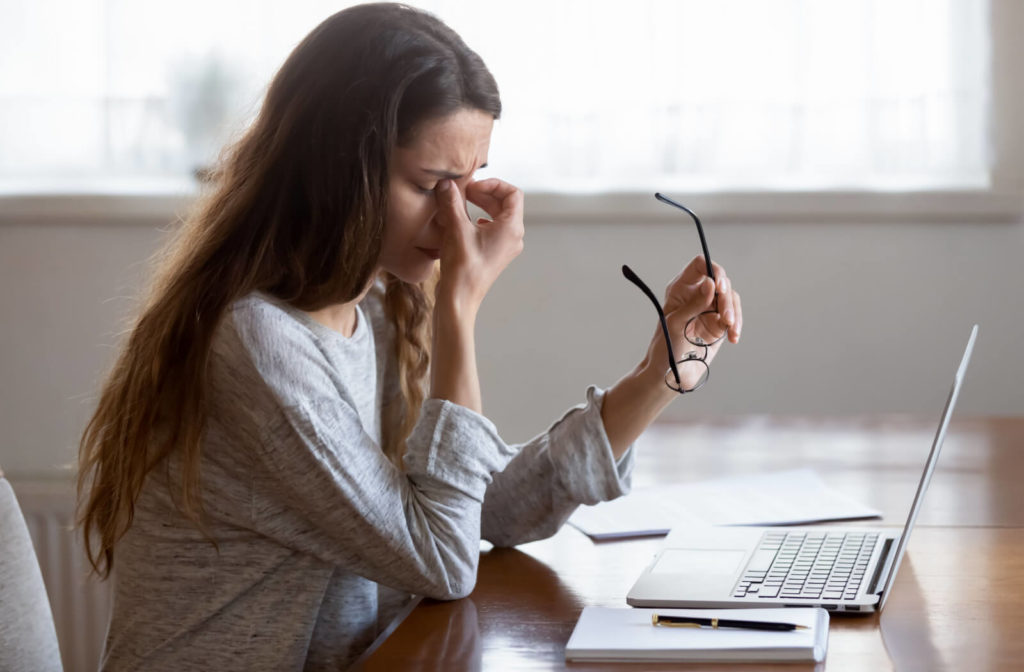Dry eyes are a condition that more than 16 million Americans experience. For many people, artificial tears or eye drops can relieve mild cases of dry eye. While there are different kinds of eye drops and artificial tears, most eye drops can be used up to 4 times a day.
When you experience dry eyes, it can affect your eye health in many ways. Your eyes may not be able to produce either enough tears to properly lubricate your eyes, or the tears that are being produced are not of high enough quality. With regular eye exams, your optometrist can diagnose the cause of your dry eyes and recommend an appropriate treatment.
Preservative vs. Preservative-Free Eye Drops
There are many ways to get relief from your symptoms causing dry eyes. Whether it is with artificial tears, prescription or non-prescription eye drops, or alternative methods, it is important to know how often you can safely use each of these methods.
One of the more common forms of relief from dry eyes is eye drops or artificial tears. The difference between these 2 forms of relief is not just what they will do for your eyes, but what they contain. With artificial tears, most times, there are no medicated products contained in these drops. Eye drops that contain preservatives will often have some form of medicine in the drops to reduce redness.
Artificial tears can be used multiple times a day, but may only be needed once a day. Some lubricating eye drops have preservatives in them. When there are preservatives, the shelf life of them is lengthened. The downside of this is that they cannot be used more than 4 times a day because they can cause irritation.
How Do Eye Drops Help with Dry Eyes?
There are many ways in which artificial tears can alleviate your dry eye symptoms, such as:
- Lubricate eyes
- Promote tear production
- Rebalance the tear film
- Reduce inflammation
Artificial tears can help relieve symptoms by adding some of the same elements of tears that your body naturally produces. This can help your natural tear film protect your eyes and work more effectively.
Why You Should Treat Dry Eye Symptoms
For many people, dry eyes may be a light to mild irritation that can be easily alleviated with artificial tears. Others may find that they are experiencing more severe symptoms, including:
- Burning, gritty, or scratching feeling in the eyes
- Stringy mucus in or around the eye
- Blurry vision
- Sensation of having something in your eyes
- Light sensitivity
If these symptoms become more pronounced and last longer, they could lead to complications. Untreated dry eye symptoms could lead to:
- Excessive discomfort—this can cause your vision to become more blurry. While it may not lead to damage to the eye itself, it can impact vision quality and eye health.
- Infection—without enough lubrication, your eye is not naturally cleaning itself. This can leave your eyes vulnerable to bacteria, causing infection.
- Eye damage—if your eyes come into contact with microscopic contaminants, such as dust, it can damage the surface of your eye. Having enough tears can wash away these particles. Without enough lubrication, these particles can stay in your eyes and scratch the surface.
Are Eye Drops Right for Me?
When it comes to treating dry eyes, the right treatment will depend on your eye health and individual needs. For many people, over-the-counter eye drops can help to alleviate symptoms. Oftentimes, if you only need to use eye drops 1–2 times per day, artificial tears can be enough to find relief.
If you find yourself applying eye drops more than 4 times a day, using preservative-free eye drops is recommended. This is also a signal that you may need a more long-term solution. See your optometrist to learn more about in-office treatments and long-term dry eye solutions.
There are many alternative methods of relief for dry eyes that your optometrist can recommend, such as:
- Restasis
- Scleral lenses
- Lifestyle changes
Find Dry Eye Treatment
To learn more about how you can find relief from your dry eye symptoms, visit your optometrist at Metro Eyecare. Book an appointment today to learn more about dry eyes and which treatment options could be right for you. Your eye health is important to us, and we’re here to answer your questions and help you move forward with clear, comfortable vision.


